雅思口语大纲
2024雅思口语最新60个话题
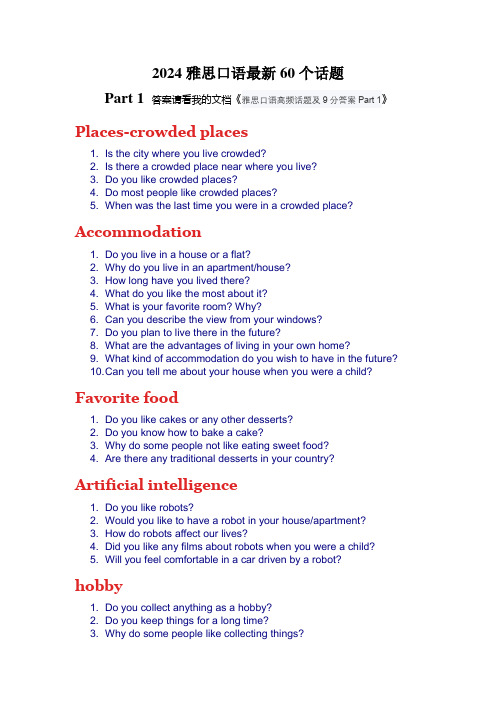
2024雅思口语最新60个话题Part 1 答案请看我的文档《雅思口语高频话题及9分答案Part 1》Places-crowded places1. Is the city where you live crowded?2. Is there a crowded place near where you live?3. Do you like crowded places?4. Do most people like crowded places?5. When was the last time you were in a crowded place? Accommodation1. Do you live in a house or a flat?2. Why do you live in an apartment/house?3. How long have you lived there?4. What do you like the most about it?5. What is your favorite room? Why?6. Can you describe the view from your windows?7. Do you plan to live there in the future?8. What are the advantages of living in your own home?9. What kind of accommodation do you wish to have in the future?10. C an you tell me about your house when you were a child? Favorite food1. Do you like cakes or any other desserts?2. Do you know how to bake a cake?3. Why do some people not like eating sweet food?4. Are there any traditional desserts in your country? Artificial intelligence1. Do you like robots?2. Would you like to have a robot in your house/apartment?3. How do robots affect our lives?4. Did you like any films about robots when you were a child?5. Will you feel comfortable in a car driven by a robot?hobby1. Do you collect anything as a hobby?2. Do you keep things for a long time?3. Why do some people like collecting things?4. Do boys and girls collect the same things?Memory1. What do you have to remember to do every day?2. Is it easy for you to forget to do these things?3. Are you good at memorizing things?4. How do you help yourself to remember things?5. Have you ever forgotten something important?Fish and fishing1. Is fishing popular in your country?2. Do you like eating fish?3. Have you ever been to a place with lots of fish around you?4. Have you ever seen any movies with lots of fish? hometown1. Where is your hometown?2. Do you like your hometown? Why?3. How long have you been living in your hometown?4. Do you believe it is a proper place to grow up? Why5. How could your hometown be improved?6. Has your hometown changed much since you were a child?7. Is there good public transportation in your hometown?8. Will you be moving away from your hometown?color1. What is your favorite color?2. Do you think color is important in your daily life?3. Are there any colors that have a special meaning in your culture?4. Do you usually help people around you?5. How do you help people around you?6. Do your parents teach you how to help others?7. What have you done to help the elderly?gifts1. What gifts do you want?2. Are you good at choosing gifts?3. Have you given other gifts made by you?Getting bored1. Do you often feel bored?2. When would you feel bored?3. What do you do when you feel bored?4. Do you think childhood is more boring or adulthood is more boring? Sunglasses1. Do you often wear sunglasses?2. Do you spend a lot of money on sunglasses?3. Do you give sunglasses as a gift?4. When do you wear sunglasses?Living area1. Where are you living now?2. Do people of different age groups live in your area?3. What do you like most about where you live?4. What is the neighborhood like where you live?5. Do you have any friends there?6. What can be improved in the area where you live?7. Do you know any famous people in the area where you live?8. Do you intend to stay in this area in the future?Running1. Do you like running?2. Where do you run?3. Which places do you think are perfect for running?4. Do you think running is a good way to stay healthy?Social media1. When did you start to use social media?2. Do you think you spend too much time on social media?3. What do people do on social media?Save money1. How do you save money?2. What do you think of e-payment?3. Do you often use credit cards?4. Do you think cash will still be popular in the future?5. Do you like spending money or saving money?music1. Do you know how to play a musical instrument?2. Do you think students should learn to play musical instruments atschool?3. Have you taken any classes on musical instruments in school?4. Which musical instrument do you like?5. How easy would it be to learn to play a musical instrument without ateacher?study1. What subjects are you studying?2. Why did you decide to study those subjects?3. Do you like your subject?4. Do you prefer to study in the mornings or the afternoons?5. Do you miss being a student?6. Is it exciting?7. Are you looking forward to working?8. How much time do you spend on your studies each week?9. Do you want to change your major?10. W hat changes would you like to see in your school?11. W hat work do you do?12. D o you like your job?13. W hy did you choose to do that type of work (or that job)?14. W hat technology do you use at work?15. W ho helps you the most? And How?16. D o you want to change to another job?2024雅思口语题库更新Part 2Describe a place where you can relax.You should say:•Where it is•What it is like•How often you go there•And explain how you feel about this place.Describe an unusual holiday/vacation you had.You should say:•When and where you went•Who you went with•What you did there•And explain why it was unusual.Describe a foreigner who can speak your language well.You should say:•who he/she is•where he/she is from•why he/she can speak your language well•and explain how you feel about this person.Describe an interesting conversation you had with an old person.You should say:•Who this person is•When and where you had the conversation•What you talked about•And explain why you think it was interesting.Describe a time when you helped someone.You should say:•Where you helped him/her•Why you helped him/her•How you helped him/her•And explain how you felt about the experience.Describe a place in your country that you think is interesting.You should say:•where it is•how you knew it•what special features it has•and explain why you are interested in it.Describe an interesting person you never met but would like to know more about him/her.You should say:•who this person is•how you knew him/her•why you think he/she is interesting•and explain how you feel about this person.Describe a job you don't want to do in the future.You should say:•What it is•Where you knew it from•Whether the job is difficult or not•And explain why you don't want to do it.Describe an outdoor activity you did in a new place recently. You should say:•What the activity is•Who invited you to participate in it•Whether you asked for help in the activity•And explain what change you had in the activity. Describe a bad service you received in a restaurant or shop. You should say:•when and where it happened•what happened•how you dealt with it•and explain how you felt about the experience. Describe a time you bought something from a street market. You should say:•When it was•Where it was•What you bought•And how you felt about it.Describe a skill that you learned when you were a teenager. You should say:•What the skill is•Who you learned it from•Why you learned it•Explain how you felt about learning itDescribe a good advertisement that you think is useful.You should say:•where you can see it•what it is about•why you think it is useful•and explain how you feel about it.Describe a uniform you wear (e.g., at school, at work).You should say:•Where you wear the uniform•How long you need to wear it•What it looks like•And explain how you feel about it.Describe a person who has interesting ideas or opinions. You should say:•who this person is•how you knew him/her•what this person does•and explain why you think his/her ideas or opinions are interesting. Describe a travel you were looking forward to but was delayed.You should say:•Where you planned to travel to•Why you were looking forward to it•Why it had to be delayed•And explain how you felt about the experienceDescribe a time when you waited a long time for a nice thing.You should say:•what you waited for•where you waited•why it was special•and explain how you felt while you were waiting.Describe a person you know who likes to talk a lot.You should say:•Who this person is•How you knew this person•What he/she usually talks about•And explain how you feel about him/her.Describe a useful object in your home that you cannot live without.You should say:•What it is•What you can do with it•How often you use it•And explain why you cannot live without it.Describe a beautiful city you have visited.You should say:•where the city is•how you knew the city•what it is famous for•and explain why it is beautiful.2024雅思口语话题汇总Part 31. Do people have enough places to relax in your country?2. What do people usually do when they are relaxed?3. Is physical activity good for relaxation?4. Do you think spending time in front of a screen helps people relax?1. Do you think people in your country have long enough holidays?2. Which holidays are popular in your country?3. What are the differences between old and young people whenspending their holidays?1. When do students in your country start to learn foreign languages?2. What qualities should a language teacher have?3. Do you have any techniques for learning languages?4. Do you think it is faster for children to learn languages than adults?5. How does technology influence language learning?1. How do people have a conversation with an elderly person?2. What can young people learn from old people?3. Do you think old people can work better than young people?4. What are the advantages of having people of different ages living inthe same house?1. Should people be very kind when they help others?2. Should children be taught to be kind to others?3. What kind of advice should parents give to their4. Can children provide any help for parents?1. How can people access travel information?2. Do people have different personalities in different regions of yourcountry?3. What causes the differences between different regions of yourcountry?4. Is an excellent tourist destination also a good place to live?1. Are there any differences in the relationship between you and yourfriends and between you and other people?2. Do people feel lonely in crowded cities?3. Can clothing tell and reveal a person's personality?4. Why do individuals from the same family have differentpersonalities?1. Do you think Al will take over many jobs?2. What would you say are the important factors to be consideredwhen choosing a career?3. Technology will make some people unemployed. How can thisproblem be solved?4. Is it common in your country for people to move to other citiesbecause of work?1. Do people go outdoors more or less now?2. What can people do outdoors besides exercising?3. When do people usually go outdoors to get close to nature?4. What can people do to get close to nature?1. How do most people respond to bad services?2. Do you think most restaurants and shops provide better servicesthan before?3. Why do some people remain silent when receiving bad service?4. What would you do as a boss to prevent bad service?1. Why do some people like to buy luxuries?2. Do you think small markets will disappear in the future?3. What are the differences between shopping in street markets andbig shopping malls?4. Do you think the goods sold at discount stores do not have goodquality?1. Where do children learn skills in your country?2. What are the differences between learning skills on your own andfrom others?3. What important skills should a child learn?4. What skills do you think teenagers should have?1. How do you feel about online advertising?2. Are there any great online advertisements?3. Why does buying new things make people happy?4. Do people still watch useless advertisements nowadays?1. Why should students wear uniforms?2. On what occasion should people wear uniforms?3. What are the advantages and disadvantages of wearing a uniform?4. Should companies ask for employees' opinions about the design ofuniforms?1. How do inventors and philosophers come up with new ideas?2. Do you think children should have their own opinions?3. Why do children often have opinions similar to their parents?4. Do you think teachers influence students' opinions?1. How do people usually go traveling?2. In what ways can traffic conditions in a city be improved?3. Do people still drive a car if public transportation is free of charge?4. How can transportation in rural areas be developed?1. On what occasions do people have to wait for a long time?2. What do people usually do while waiting?3. Why do most children have difficulties waiting for a long time?4. Do people queue consciously while waiting for the subway train? 1. How should parents encourage their children to express themselveswhen being asked questions that they are afraid to answer?2. Why do some children talk more than their peers?3. What kind of professions involve talking to groups of people?1. What equipment do you find difficult to use?2. Why do some people in the workplace dislike technology?3. Why do people buy a lot of household appliances?4. What do people often do with electronic devices?1. What are the differences between modern towns and modern cities?2. Why do some people like to visit historical sites?3. Does historic preservation contradict economic development?4. Who should be responsible for protecting historical buildings?。
雅思口语有哪些考试内容
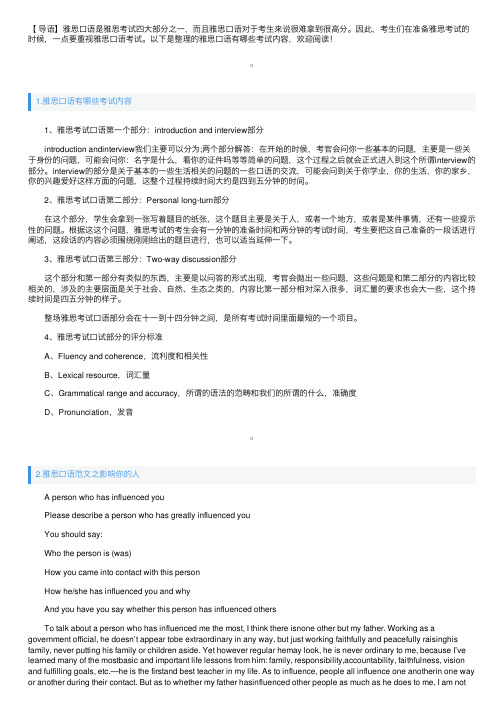
【导语】雅思⼝语是雅思考试四⼤部分之⼀,⽽且雅思⼝语对于考⽣来说很难拿到很⾼分。
因此,考⽣们在准备雅思考试的时候,⼀点要重视雅思⼝语考试。
以下是整理的雅思⼝语有哪些考试内容,欢迎阅读!1.雅思⼝语有哪些考试内容 1、雅思考试⼝语第⼀个部分:introduction and interview部分 introduction andinterview我们主要可以分为;两个部分解答:在开始的时候,考官会问你⼀些基本的问题,主要是⼀些关于⾝份的问题,可能会问你:名字是什么,看你的证件吗等等简单的问题,这个过程之后就会正式进⼊到这个所谓interview的部分。
interview的部分是关于基本的⼀些⽣活相关的问题的⼀些⼝语的交流,可能会问到关于你学业,你的⽣活,你的家乡,你的兴趣爱好这样⽅⾯的问题,这整个过程持续时间⼤约是四到五分钟的时间。
2、雅思考试⼝语第⼆部分:Personal long-turn部分 在这个部分,学⽣会拿到⼀张写着题⽬的纸张,这个题⽬主要是关于⼈,或者⼀个地⽅,或者是某件事情,还有⼀些提⽰性的问题。
根据这这个问题,雅思考试的考⽣会有⼀分钟的准备时间和两分钟的考试时间,考⽣要把这⾃⼰准备的⼀段话进⾏阐述,这段话的内容必须围绕刚刚给出的题⽬进⾏,也可以适当延伸⼀下。
3、雅思考试⼝语第三部分:Two-way discussion部分 这个部分和第⼀部分有类似的东西,主要是以问答的形式出现,考官会抛出⼀些问题,这些问题是和第⼆部分的内容⽐较相关的,涉及的主要层⾯是关于社会、⾃然、⽣态之类的,内容⽐第⼀部分相对深⼊很多,词汇量的要求也会⼤⼀些,这个持续时间是四五分钟的样⼦。
整场雅思考试⼝语部分会在⼗⼀到⼗四分钟之间,是所有考试时间⾥⾯最短的⼀个项⽬。
4、雅思考试⼝试部分的评分标准 A、Fluency and coherence,流利度和相关性 B、Lexical resource,词汇量 C、Grammatical range and accuracy,所谓的语法的范畴和我们的所谓的什么,准确度 D、Pronunciation,发⾳2.雅思⼝语范⽂之影响你的⼈ A person who has influenced you Please describe a person who has greatly influenced you You should say: Who the person is (was) How you came into contact with this person How he/she has influenced you and why And you have you say whether this person has influenced others To talk about a person who has influenced me the most, I think there isnone other but my father. Working as a government official, he doesn’t appear tobe extraordinary in any way, but just working faithfully and peacefully raisinghis family, never putting his family or children aside. Yet however regular hemay look, he is never ordinary to me, because I’ve learned many of the mostbasic and important life lessons from him: family, responsibility,accountability, faithfulness, vision and fulfilling goals, etc.—he is the firstand best teacher in my life. As to influence, people all influence one anotherin one way or another during their contact. But as to whether my father hasinfluenced other people as much as he does to me, I am notsure. Nevertheless Ialways hear people in the neighborhood talking about him as a model husband andfamily head. He must have touched some lives. 本题要求考⽣突出⼀个对⾃⼰影响巨⼤的⼈,尽管⾝边所有的⼈都总是⽆时⽆刻或多或少地在互相影响着⾃⼰。
雅思口语考试及介绍

雅思口语考试及介绍雅思口语考试是雅思考试中的一项重要部分,用于评估考生的口语能力。
考试时间为11-14分钟,分为三个部分,旨在测试考生的口语流利度、语音和语法、词汇和句型的使用、表达意思的能力和对各种话题的掌握程度。
第一部分为考官与考生之间的自我介绍,考生需要回答有关自己的问题,如姓名、国籍、居住地、职业、爱好等。
该部分主要用于考官熟悉考生的口语水平和驾驭话题的能力。
第二部分考生需在规定时间内准备关于给定题目的观点,并进行简短的发言,该部分的时间为3-4分钟。
每个话题都涉及生活或工作方面的话题,例如旅行、媒体、教育、社会等等。
考生需要根据个人经验,分析该话题并阐述自己的观点.第三部分考生将在给定的时间内回答考官提出的有关给定主题的问题,该部分的时间为4-5分钟。
这个部分有时可能涉及复杂的话题,建议考生思考如何用举例来证明自己的意见、如何评估两种观点的好处和不足以及如何用不同的角度来思考和答题。
考生需要在考试中展现自信、流利口语和丰富的词汇与语言知识,同时还需要考虑到语音和发音的准确性,使用适当的语法和句型,轻松地与考官交流。
口语考试的技巧包括在考试开始前练习口语、提高自己的听力和朗读能力、词汇练习、寻找相关资料和阐述自己的观点。
除此之外,考生还应注意自己的姿态、音量和表情,以尽可能地让自己的语言表达更具说服力和自然性。
最后,雅思口语考试的准备需要充足的时间和耐心,因此建议考生提前做准备并参加模拟考试以提高自己的信心和准确性。
通过系统和科学的复习和练习,考生将更有把握在雅思考试中获得较高的口语成绩。
雅思口语考试是英语必备能力之一。
雅思口语从根本上算是英语听说能力的测评,旨在考察考生在生活、工作和学习等方面应用英语的能力。
归纳起来,考试的主要内容包括流利度、语音和语法、词汇和句型的使用、表达意思的能力和对各种话题的掌握程度。
因此,高分口语相比其他语言技能,更需要有相关的技巧和策略。
首先,考场上考生应该保持冷静,不要因为考试紧张而影响思考和表达。
雅思口语全方位复习讲义精华.pptx

Writing Travel
advertisemen ts Films
第13页/共69页
(二)雅思口语第一部分是怎么进行的?
雅思口语第一部分提问模式非常固定,考官主要是按照下面几种模式想考生提问:
1. Do you…? 2.Do people in your country do…? 3.What type of …do you like? 4.What type of …do you dislike? 5.What do you like about…? 6.What do you dislike about…? 7.What do you like to do +时间? 8.What do you dislike to do +时间? 9.Is it easy/difficult/convenient/safe/dangerous to do…? 10.When did you first do …? 11.Did you do…when you were a child? 12.When did you last do …? / Tell me about your last …experience? 13.When and where do you…? 14.Do you like do…alone or with friends? 15.Do you prefer A or B? Why? 16.Do you think it’s necessary/important for children/schools to
Is food safety a serious problem in your country? Do schools and universities provide healthy food for students in your country?
雅思(学术类)课程教学大纲
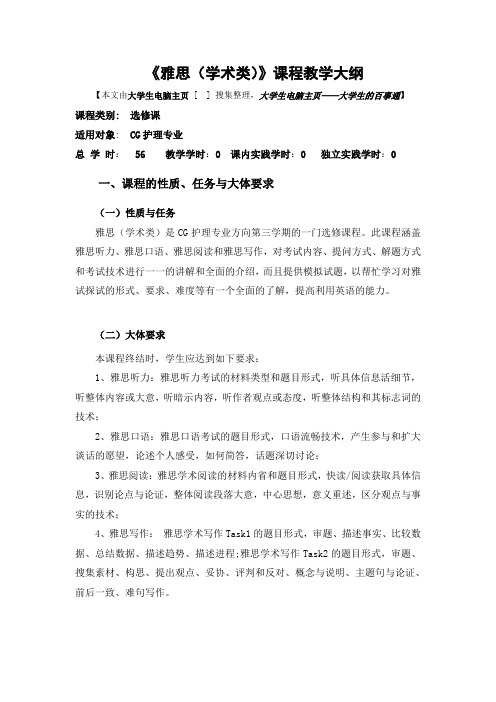
《雅思(学术类)》课程教学大纲【本文由大学生电脑主页[ ] 搜集整理,大学生电脑主页——大学生的百事通】课程类别: 选修课适用对象: CG护理专业总学时: 56 教学学时:0课内实践学时:0独立实践学时:0一、课程的性质、任务与大体要求(一)性质与任务雅思(学术类)是CG护理专业方向第三学期的一门选修课程。
此课程涵盖雅思听力、雅思口语、雅思阅读和雅思写作,对考试内容、提问方式、解题方式和考试技术进行一一的讲解和全面的介绍,而且提供模拟试题,以帮忙学习对雅试探试的形式、要求、难度等有一个全面的了解,提高利用英语的能力。
(二)大体要求本课程终结时,学生应达到如下要求:1、雅思听力:雅思听力考试的材料类型和题目形式,听具体信息活细节,听整体内容或大意,听暗示内容,听作者观点或态度,听整体结构和其标志词的技术;2、雅思口语:雅思口语考试的题目形式,口语流畅技术,产生参与和扩大谈话的愿望,论述个人感受,如何简答,话题深切讨论;3、雅思阅读:雅思学术阅读的材料内省和题目形式,快读/阅读获取具体信息,识别论点与论证,整体阅读段落大意,中心思想,意义重述,区分观点与事实的技术;4、雅思写作:雅思学术写作Task1的题目形式,审题、描述事实、比较数据、总结数据、描述趋势、描述进程;雅思学术写作Task2的题目形式,审题、搜集素材、构思、提出观点、妥协、评判和反对、概念与说明、主题句与论证、前后一致、难句写作。
二、要紧教学内容及教学要求THE LISTENING MODULEUnit 1 Introduction要紧教学内容1、General information2、Listening Test Format3、Questions Type教学要求要求同窗们把握雅思听力的大体技术,熟悉雅思听力的大体组成与题目类型。
Unit 2 Listening Strategies and Skills要紧教学内容1、Listening for specific information2、Identifying detail3、Identifying main ideas4、Seeing beyond the surface meaning5、Following signpost words6、Being aware of stress, rhythm and intonation教学要求要求同窗们把握雅思听力的大体技术,能够把握听力大体技术并提高英语的运用技术。
雅思口语讲义.pptx

感谢您的观看!
4这Biblioteka 回答还不够!• 口语不好的同学,会这样回答: • Umm…(脑袋开始发晕了) BMW…Well…BMW Mini Cooper…It…it looks small
but…small and…expensive…Umm… It costs expensive… Because it is cute so I want to buy… • 时间才过了30秒 • “That‘s all ?” 考官问。 • Emm… Umm… • ………………
两分钟开始了!
• 带着你的关键词:Car (no t moto/b icycle), Minicooper, Blue Medium Size, Fashionable, Attracting, Expensive, cannot buy now, convenience, show off, safety
7
两分钟开始了!
• 带着你的关键词:Car (no t moto/b icycle), Minicooper, Blue Medium Size, Fashionable, Attracting, Expensive, cannot buy now, convenience, show off, safety
• 套用背好的开头! • It has been my dream car since I saw the movie “The Italian Job” two year ago,
in which Mini Cooper is the biggest star. • 接着串关键词! • I would choose a car rather than a motor or bicycle because cars are perfect
雅思口语第一部分常见话题
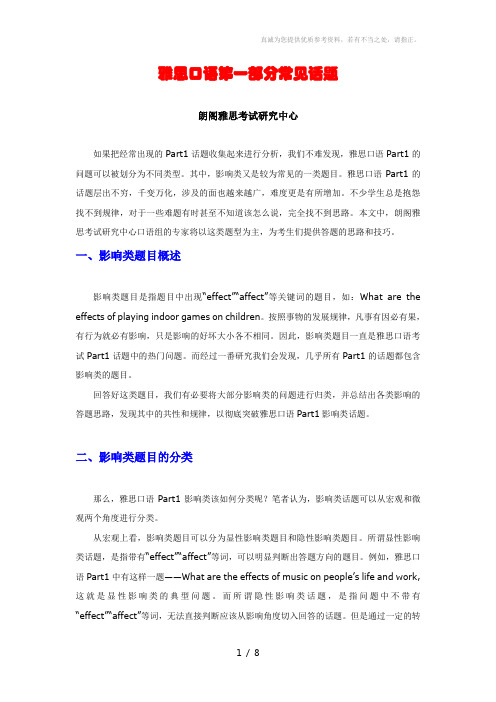
雅思口语第一部分常见话题朗阁雅思考试研究中心如果把经常出现的Part1话题收集起来进行分析,我们不难发现,雅思口语Part1的问题可以被划分为不同类型。
其中,影响类又是较为常见的一类题目。
雅思口语Part1的话题层出不穷,千变万化,涉及的面也越来越广,难度更是有所增加。
不少学生总是抱怨找不到规律,对于一些难题有时甚至不知道该怎么说,完全找不到思路。
本文中,朗阁雅思考试研究中心口语组的专家将以这类题型为主,为考生们提供答题的思路和技巧。
一、影响类题目概述影响类题目是指题目中出现“effect”“affect”等关键词的题目,如:What are the effects of playing indoor games on children。
按照事物的发展规律,凡事有因必有果,有行为就必有影响,只是影响的好坏大小各不相同。
因此,影响类题目一直是雅思口语考试Part1话题中的热门问题。
而经过一番研究我们会发现,几乎所有Part1的话题都包含影响类的题目。
回答好这类题目,我们有必要将大部分影响类的问题进行归类,并总结出各类影响的答题思路,发现其中的共性和规律,以彻底突破雅思口语Part1影响类话题。
二、影响类题目的分类那么,雅思口语Part1影响类该如何分类呢?笔者认为,影响类话题可以从宏观和微观两个角度进行分类。
从宏观上看,影响类题目可以分为显性影响类题目和隐性影响类题目。
所谓显性影响类话题,是指带有“effect”“affect”等词,可以明显判断出答题方向的题目。
例如,雅思口语Part1中有这样一题——What are the effects of music on people’s life and work, 这就是显性影响类的典型问题。
而所谓隐性影响类话题,是指问题中不带有“effect”“affect”等词,无法直接判断应该从影响角度切入回答的话题。
但是通过一定的转换,我们可以把隐性影响类话题变为显性影响类话题。
雅思口语-IELTS-SPEAKING小提纲

SPEAKINGPart1People&AnimalWork or study(Is there anything interesting in your work?What can help you do better in your work?Where did you go to school?What do you expect yourschool to improve?Are you satisfied with your campus or not?Howmany hours do you study a week?Do you think your school is a goodplace for study?)NamePetMovie star(Who is your favorite movie star?Have you met a movie star in your daily life?Is international star popular in your country?)EventsTransportation(Do you always take buses?Have you ever travelled by taxi?Is there any traffic jam in the area you live?)Public holiday(Do you like public holidays?What do you do on public holidays?Which public holiday do you like most?)Sports(What’s the most popular sport in your country?Who’s your mostfavorite sport star?)Take photos(Do you take photos using your phone or camera?What photos do you take?Do you want to learn how to take photos?How do you usuallydeal with your photos?Do you like to take selfies?Why?)Morning routine(Do you think breakfast is important?What are the benefits ofbreakfast?Do you want to change your morning routine?) Cooking(Do you like cooking at home or eating out?)SleepingObjects/ThingsPainting(What kind of painting do you like?Have you learned drawing or painting?Is it important to hang pictures at home?If someone wants to draw a picture ofyou,will you agree?Movie(How often did you watch a movie in your childhood?How often do you watcha movie now?Do you prefer to go to a movie alone or with others?)Email(How often do you write an email?When do you write an email?)Water(How often do you drink water?Do you like to drink water?Is there any time when you feel very thirsty but you can’t drink water?Do you like bottledwater or tap water?Is bottled water expensive in your country?)Music(How often do you listen to the music?When do you listen to the music?What is the kind of music that you don’t like?Do you want to learn any musicalinstrument?Have you ever gone to a concert?)Shoes(Do you like comfortable shoes or fashionable shoes?Do you buy shoes online?How often do you buy shoes?Describe your most favorite pair ofshoes.)Sunglasses(Do you wear sunglasses?Do you buy a lot of sunglasses?Have you ever lost sunglasses?)Tea/Coffee(Do Chinese people prefer coffee or tea?Why?When was the last time you had coffee?Where do you like to drink coffee?)PlaceLiving place(Where do you live?What do you like about the place you live?Do you know someone who live nearby?Will you keep living at there for a longtime?Is there any recent change in the area you live?)HometownGarden/Park(Do you usually go to the park?When’s the last time that you went to the park?Do you like outdoor park or indoor park?Are public parksimportant in China?Are there many public gardens in China?Do youthink there are enough public gardens or parks in your hometown?Whatdo you think are the benefits of having gardens in the city?)Crowded placeCity(How long have you lived in this city?What’s your impression of this city?What do you expect this city to change?)AbstractHandwriting(Are there many people in China who like to write by hand?Do youusually write by hand or type through laptop?Do you want to receive ahandwritten card?Is your handwriting hard to recognize?Do you thinkhandwriting can reflect personality?)Watch skyWeather(Do you like cloudy days?Are there many cloudy days a year in the city you live?)Patience(Are you a patient person?Are you more patient when you were young than you are now?)Color(What’s your favorite color?Why?Do you like light colors?What color do you want to use for your bedroom’s wall?Is the color of a car important?)Part2&3People&AnimalDescribe an intelligent person一个聪明的人Describe a person you would like to know你想认识的人Describe an old person who is interesting你遇到的有趣的老人Describe a person you enjoy working or studying with你想一起工作或学习的人Describe a person you wanted to be similar to when you were growing up你长大想成为的人Describe a person you have seen who is beautiful or handsome俊男美女EventsDescribe a time that you have to change your plan suddenly突然改变计划Describe a time that someone did not tell you the whole truth about something.隐瞒真相Describe a time that you receive what you really want.一次你得到了你真正想要的东西。
2024联考英语考纲

2024联考英语考纲一、语言知识本考试要求考生掌握的词汇量约为5500个单词及相关词组。
要求考生能够运用词汇理解和表达不同类型的话题,包括日常生活、学习、工作、人文、科技等方面。
考生需要了解英语语法的基本规则,能够正确理解和运用复杂句型,掌握一定的阅读和写作技巧。
二、语言技能1. 阅读理解:考生需要具备快速阅读、理解文章主旨、细节和推理的能力,能够根据上下文推测生词含义,理解作者观点和态度。
2. 写作:考生需要能够根据题目要求,撰写不同类型的应用文,包括信函、通知、便条等,同时还需要能够撰写议论文、说明文等不同类型的短文。
3. 听力:考生需要能够听懂日常生活和学术领域的一般性话题,并理解听力材料的主旨和要点。
4. 口语:考生需要能够运用基本的英语口语表达自己的观点和想法,包括日常生活、学习、工作等方面的内容。
三、考试形式与试卷结构1. 考试形式:本考试采用闭卷笔试形式,考试时间为120分钟,总分为100分。
2. 试卷结构:试卷分为四部分,分别为听力理解、阅读理解、写作和翻译。
每部分题型和分值如下:- 听力理解:20题,每题1分,共20分;- 阅读理解:30题,每题2分,共60分;- 写作:1题,共20分;- 翻译:1题,共20分。
四、能力要求本考试主要考察考生的英语综合能力,包括听、说、读、写、译五个方面。
要求考生在语言知识方面有一定的基础,掌握一定量的词汇和语法规则;在语言技能方面,要求考生能够熟练运用英语进行日常交流和表达思想;在考试形式与试卷结构方面,要求考生能够适应不同的题型和考试形式,掌握答题技巧。
五、内容要求本考试主要考察考生的英语语言水平和综合能力,不特定限制内容范围。
考生需要在规定的考试时间内完成听、说、读、写、译等方面的试题,并且要能够正确理解和表达相关的英语知识和技能。
雅思口语考试内容解析(精选)
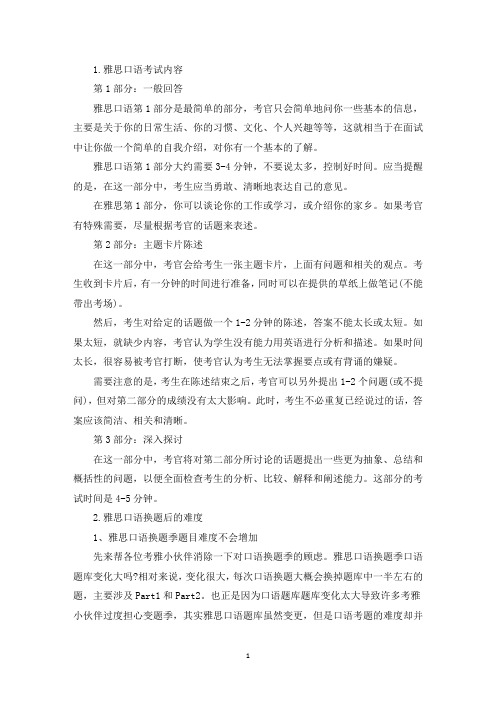
1.雅思口语考试内容第1部分:一般回答雅思口语第1部分是最简单的部分,考官只会简单地问你一些基本的信息,主要是关于你的日常生活、你的习惯、文化、个人兴趣等等,这就相当于在面试中让你做一个简单的自我介绍,对你有一个基本的了解。
雅思口语第1部分大约需要3-4分钟,不要说太多,控制好时间。
应当提醒的是,在这一部分中,考生应当勇敢、清晰地表达自己的意见。
在雅思第1部分,你可以谈论你的工作或学习,或介绍你的家乡。
如果考官有特殊需要,尽量根据考官的话题来表述。
第2部分:主题卡片陈述在这一部分中,考官会给考生一张主题卡片,上面有问题和相关的观点。
考生收到卡片后,有一分钟的时间进行准备,同时可以在提供的草纸上做笔记(不能带出考场)。
然后,考生对给定的话题做一个1-2分钟的陈述,答案不能太长或太短。
如果太短,就缺少内容,考官认为学生没有能力用英语进行分析和描述。
如果时间太长,很容易被考官打断,使考官认为考生无法掌握要点或有背诵的嫌疑。
需要注意的是,考生在陈述结束之后,考官可以另外提出1-2个问题(或不提问),但对第二部分的成绩没有太大影响。
此时,考生不必重复已经说过的话,答案应该简洁、相关和清晰。
第3部分:深入探讨在这一部分中,考官将对第二部分所讨论的话题提出一些更为抽象、总结和概括性的问题,以便全面检查考生的分析、比较、解释和阐述能力。
这部分的考试时间是4-5分钟。
2.雅思口语换题后的难度1、雅思口语换题季题目难度不会增加先来帮各位考雅小伙伴消除一下对口语换题季的顾虑。
雅思口语换题季口语题库变化大吗?相对来说,变化很大,每次口语换题大概会换掉题库中一半左右的题,主要涉及Part1和Part2。
也正是因为口语题库题库变化太大导致许多考雅小伙伴过度担心变题季,其实雅思口语题库虽然变更,但是口语考题的难度却并不会发生很大变化。
雅思口语题库的题目繁多,大家在备考过程中往往不能将所有题目全部过一遍,只能根据口语题库挑选其中的一部分来备考,即便不在换题季,也有可能会遇到没有准备过的陌生题目。
《雅思口语教案》

《雅思口语教案》Word版第一章:雅思口语考试概述1.1 雅思口语考试形式和结构1.2 雅思口语考试评分标准1.3 雅思口语考试题型及应对策略第二章:雅思口语Part 1话题与技巧2.1 常见话题及应对策略2.2 个人信息类问题回答技巧2.3 物品类问题回答技巧2.4 地点类问题回答技巧2.5 事件类问题回答技巧第三章:雅思口语Part 2话题与技巧3.1 常见话题及应对策略3.2 人物描述技巧3.3 物体描述技巧3.4 地点描述技巧3.5 事件描述技巧第四章:雅思口语Part 3话题与技巧4.1 常见话题及应对策略4.2 抽象问题回答技巧4.3 社会问题回答技巧4.4 两难问题回答技巧4.5 解决方案类问题回答技巧第五章:雅思口语实战演练5.1 模拟雅思口语考试环境5.2 学生分组练习5.3 教师点评与指导5.4 常见问题解答与优化第六章:雅思口语Part 1高频话题与实战演练6.1 家庭与环境6.2 学习和职业6.3 兴趣爱好和休闲活动6.4 旅行和假期6.5 科技与日常生活6.6 实战演练与教师点评第七章:雅思口语Part 2高频话题与实战演练7.1 人物描述7.2 物体描述7.3 地点描述7.4 事件描述7.5 实战演练与教师点评第八章:雅思口语Part 3高频话题与实战演练8.1 教育类话题8.2 环境类话题8.3 社会类话题8.4 科技类话题8.5 实战演练与教师点评第九章:雅思口语答题技巧与策略9.1 语言表达技巧9.2 逻辑思维与连贯性9.3 词汇与句型运用9.4 听力技巧在口语中的应用9.5 实战演练与教师点评第十章:雅思口语考前冲刺与模拟考试10.1 考前冲刺策略10.2 模拟考试环境与流程10.3 学生答题与教师点评10.4 常见问题解答与优化10.5 考前心理调节与鼓励重点和难点解析一、雅思口语考试概述重点和难点解析:理解和掌握雅思口语考试的形式、结构和评分标准是基础,需要重点关注每个部分的时间分配、题型和评分要点。
教学大纲-大学外语(雅思口语)
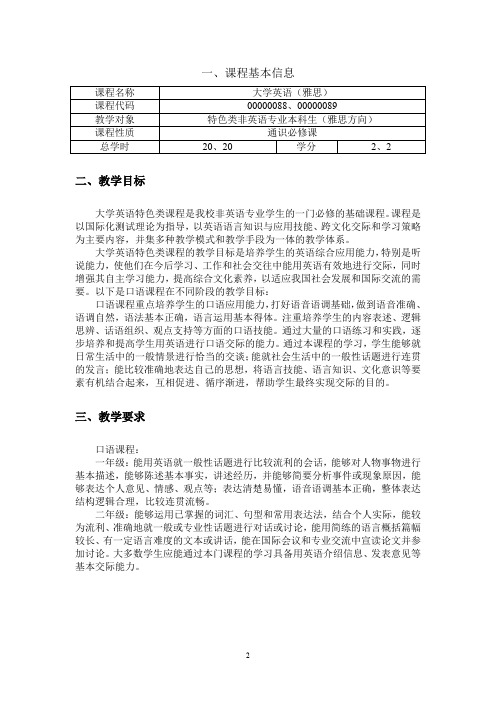
一、课程基本信息二、教学目标大学英语特色类课程是我校非英语专业学生的一门必修的基础课程。
课程是以国际化测试理论为指导,以英语语言知识与应用技能、跨文化交际和学习策略为主要内容,并集多种教学模式和教学手段为一体的教学体系。
大学英语特色类课程的教学目标是培养学生的英语综合应用能力,特别是听说能力,使他们在今后学习、工作和社会交往中能用英语有效地进行交际,同时增强其自主学习能力,提高综合文化素养,以适应我国社会发展和国际交流的需要。
以下是口语课程在不同阶段的教学目标:口语课程重点培养学生的口语应用能力,打好语音语调基础,做到语音准确、语调自然,语法基本正确,语言运用基本得体。
注重培养学生的内容表述、逻辑思辨、话语组织、观点支持等方面的口语技能。
通过大量的口语练习和实践,逐步培养和提高学生用英语进行口语交际的能力。
通过本课程的学习,学生能够就日常生活中的一般情景进行恰当的交谈;能就社会生活中的一般性话题进行连贯的发言;能比较准确地表达自己的思想,将语言技能、语言知识、文化意识等要素有机结合起来,互相促进、循序渐进,帮助学生最终实现交际的目的。
三、教学要求口语课程:一年级:能用英语就一般性话题进行比较流利的会话,能够对人物事物进行基本描述,能够陈述基本事实,讲述经历,并能够简要分析事件或现象原因,能够表达个人意见、情感、观点等;表达清楚易懂,语音语调基本正确,整体表达结构逻辑合理,比较连贯流畅。
二年级:能够运用已掌握的词汇、句型和常用表达法,结合个人实际,能较为流利、准确地就一般或专业性话题进行对话或讨论,能用简练的语言概括篇幅较长、有一定语言难度的文本或讲话,能在国际会议和专业交流中宣读论文并参加讨论。
大多数学生应能通过本门课程的学习具备用英语介绍信息、发表意见等基本交际能力。
四、主要教学内容第三学期口语Unit 1 Impressions (2学时)【目的要求】To learn to talk about famous eventsTo get familiar with expressions about appearanceTo develop communication skill of making an interview【主要内容】Talking about famous events and describing a person’s image and clothes【重点难点】Talk about one’s dressing styleDescribe a past event by using different kind of past tensesMaster some collocations of people’s appearance【课后作业】Task 1: Describe one of your shopping experiences by using more than 3 kind of past tenses and post the text online.Task 2: Role-play: Work in pairs and make in interview of the interviewee’s dressing style.Task 3: Preview: Read Passage Problem Parents on Page 16.Unit 2 Generations (2学时)【目的要求】To familiarize the students with the expressions of personalityTo complete sentences by using various verb patternsTo develop presentation skill of giving advice【主要内容】Talking relationships between families【重点难点】Talk about advice for meeting a boyfriend or girlfriend’s parents for the first time Grasp the key language points and grammatical structures in the reading partLearn the sentences with adjective structures【课后作业】Task 1: Prepare for a 3-minute oral presentation about the important characteristics of a future partner, and post it online.Task 2: Give your partner some advice on problem parents.Task 3: Preview the passage Gold Fever on Page 24.Unit 3 Gold (2学时)【目的要求】To familiarize the students with the expressions of wealthTo develop the presentation skill of making a sales presentationTo let students master the skills: retell a story happened in the past【主要内容】Talking about wealth【重点难点】Retell the story the students have heardGrasp the usage of metaphorGet familiar with collocations of have, make and take【课后作业】Task 1: Role-play: Make a role-play of selling some item to your partner, and persuade him/her to buy it.Task 2: Research: Find more metaphors in daily conversation. For example, TIME=MONEY.Task 3: Preview: Read passage Ben Saunders: Polar explorer on Page 37.Unit 4 Challenge (2学时)【目的要求】To familiarize the students with the expressions of challengeTo raise students’ awareness of using tenses of future continuous and future perfect To make students grasp the presentation skill of telling a story【主要内容】Talking about doing things for charity, the future, health and exercise【重点难点】Talk about something challengingGrasp the key language points and grammatical structures in the reading partLearn to describe something will happen in the future by using different kinds of future tenses【课后作业】Task 1: Tell your one of you plans. Send your ideas in voice-record via WeChat and it should last about 2 minutes.Task 2: Preview: Passage Mind Games on page 47.Unit 5 Ritual (2学时)【目的要求】To familiarize the students with the expressions of ritualTo develop the presentation skill of discussing a problem from different viewpoints To let students master the skills: talking about habits【主要内容】Talking about habits, marriage and routines in the past and present【重点难点】Talking about a weddingGrasp the key language points and grammatical structures in the reading partUse used to, will and would to talk about a habit【课后作业】Task 1: Describe a wedding ceremony.Task 2: Use the Six Thinking Hat method to solve a problem.Task 3: Preview Passage Is it time to give up meat on Page 60.Unit 6 Eat (2学时)【目的要求】To familiarize the students with the expressions of vegetarianTo help students master the present perfect simple and continuousTo let students master the presentation skill: persuasive talk【主要内容】Talking about restaurant experiences and vegetarianism【重点难点】Talking about a bad restaurant experienceGrasp the key language points and grammatical structures in the reading partLearn to use the discourse markers【课后作业】Task 1: Make a presentation of a persuasive talk on becoming a vegetarian and post online;Task 2: Further the reading of the rest of the text, and try to pick up the expressions that help read between the lines;Task 3: Make a review of the presentation skills from Unit 1 to Unit 6.第四学期:Unit 7 Escape(2学时)【目的要求】To learn to talk about holidaysTo get familiar with word formation: suffixes ful, ish and lessTo learn to talk about personality【主要内容】Talking about beach holidays(1学时)Learning suffixes (1学时)【重点难点】Describing a holidayLearning vocabulary about personality【课后作业】Task 1: Describe a postcard you have received.Task 2: Complete grammar extra on Page 139Task 3: Preview Passage Is beauty in the eye of the beholder on Page 79. Unit 8 Attraction (2学时)【目的要求】To learn to talk about attractive facial featuresTo get familiar with structure have/ get something doneTo learn to vocabulary about personality【主要内容】Talking about beauty(1学时)Talking about personality(1学时)【重点难点】Describing a person’s appearanceDescribing a person’s personality【课后作业】Task 1: Describe the facial feature of one of your classmates.Task 2: Describe your own personality.Task 3: Preview Passage Where to go to see a masterpiece on Page 89. Unit 9 Genius (2学时)【目的要求】To learn to talk about architectureTo get familiar with past modals of deductionTo learn to some synonyms【主要内容】Talking about building (1学时)Talking about deduction (1学时)【重点难点】Describing a building【课后作业】Task 1: Describe your favorite building.Task 2: Complete grammar extra on Page 141.Task 3: Preview Passage Bonfire of the BRANDS on Page 101.Unit 10 Sell (2学时)【目的要求】To learn to talk about advertisementTo get familiar with vocabulary about sales and marketingTo learn to relative clauses【主要内容】Talking about advertising (1学时)Learning relative clauses (1学时)【重点难点】Describing relationship between children and advertisementLearning relative clauses【课后作业】Task 1: Talk about relationship between children and advertisement.Task 2: Complete grammar extra on Page 141.Task 3: Preview Passage Look at us now! on Page 111.Unit 11 Student (2学时)【目的要求】To learn to talk about school and educationTo get familiar with future forms and future time clausesTo comprehend abbreviations and acronyms【主要内容】Talking about education (1学时)Learning future forms and future time clauses (1学时)【重点难点】Discuss when the young people should make their own decisionUsing appropriate language in a job interview【课后作业】Task 1: Role play: A job interview.Task 2: Complete grammar extra on Page 143.Task 3: Preview Passage The earth shelter on Page 119.Unit 12 Home (4学时)【目的要求】To learn to talk about houseTo get familiar with collocations of house and furnishingTo learn participle clauses【主要内容】Talking about houses (1学时)Learning participle clauses (1学时)Revision and exam (2学时)【重点难点】Describing a houseLearning collocations of house and furnishing【课后作业】Task 1: Talk about your favorite room.Task 2: Complete grammar extra on Page 143.五、教学方法与课程模式课程模式基本划分为一年级基础课程,重点是学生雅思基础词汇的讲解,基本阅读技巧的介绍,以及口语语音、语调与语感的纠正和培养。
雅思口语三部分的答题指导
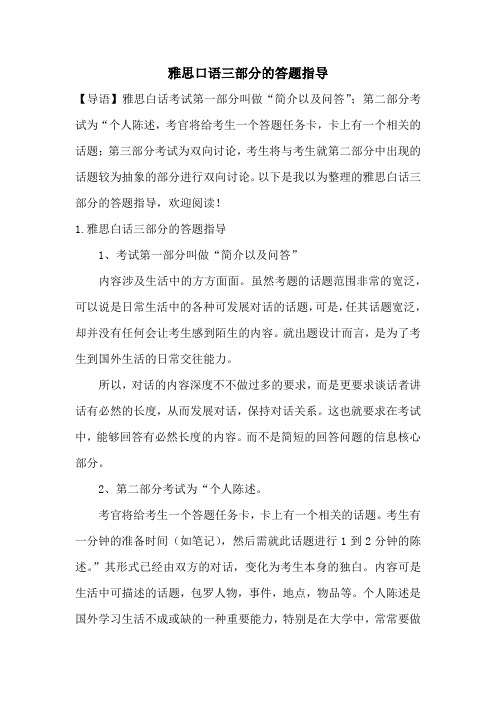
雅思口语三部分的答题指导【导语】雅思白话考试第一部分叫做“简介以及问答”;第二部分考试为“个人陈述,考官将给考生一个答题任务卡,卡上有一个相关的话题;第三部分考试为双向讨论,考生将与考生就第二部分中出现的话题较为抽象的部分进行双向讨论。
以下是我以为整理的雅思白话三部分的答题指导,欢迎阅读!1.雅思白话三部分的答题指导1、考试第一部分叫做“简介以及问答”内容涉及生活中的方方面面。
虽然考题的话题范围非常的宽泛,可以说是日常生活中的各种可发展对话的话题,可是,任其话题宽泛,却并没有任何会让考生感到陌生的内容。
就出题设计而言,是为了考生到国外生活的日常交往能力。
所以,对话的内容深度不不做过多的要求,而是更要求谈话者讲话有必然的长度,从而发展对话,保持对话关系。
这也就要求在考试中,能够回答有必然长度的内容。
而不是简短的回答问题的信息核心部分。
2、第二部分考试为“个人陈述。
考官将给考生一个答题任务卡,卡上有一个相关的话题。
考生有一分钟的准备时间(如笔记),然后需就此话题进行1到2分钟的陈述。
”其形式已经由双方的对话,变化为考生本身的独白。
内容可是生活中可描述的话题,包罗人物,事件,地点,物品等。
个人陈述是国外学习生活不成或缺的一种重要能力,特别是在大学中,常常要做个人陈述,来展示本身论文架构,或者小组活动结果等。
其要求是,能够让听众能够清晰地知道讲话内容,并且在听时没有较大的困难去跟上整个陈述的思路。
这就要求考试中,除了词汇和语法的正确运用,更加着重提高本身的流利度与连贯度。
因为,如果一个陈述丢失了流利度,会很容易让听者失去“听”的兴趣,并造成理解上的困难。
同时,一个陈述如果失去了连贯度,很难让听者紧跟演说者的思路,容易失去对整篇文章的把握。
3、第三部分考试为“双向讨论。
考生将与考生就第二部分中出现的话题较为抽象的部分进行双向讨论”。
可以看出,考试形式又变为了互动式,并且在内容上从较为常见、易懂的生活化的话题,变成了难寻规律的、较深奥的话题讨论。
雅思考试口语题型介绍

雅思考试口语题型介绍在预备雅思口语考试的过程中,考生需要了解和熟识常见的考试题目,以提高备考的效率。
今日我给大家带来雅思索试口语题型介绍,盼望能够关心到大家,下面我就和大家共享,来观赏一下吧。
雅思索试口语题型介绍雅思口语题型介绍:雅思口语题型1、从内容来看:首部分:考生通常需要向考官做自我简介,同时还要核对考生的身份。
后面考官会通过考生熟识的话题做询问。
想要担保题目的全都性,这些问题通常是可以从一个事先拟定的范围内抽取的。
此方面的时间在4到5分钟。
其次部分:是给考生作个人陈述。
依据话题卡,考生们是有一分钟的预备时间,而后又要求用这一话题做1到2分钟的陈述。
考官通常是会在2分钟以后打断考生,同时在提问一两个问题当成结束语。
要求留意的是2分钟后打断考生,终止回答是正常的,由于此部分的考试时间只有3到4分钟。
第三部分:考官是会围绕其次部分口语考试牵涉的话题与考官进行争论,这部分同样成为了获得口语高分的关键,考试时间在4-5分钟。
雅思口语题型2、从形式来看:一部分客观问题通过考生的基本背景的问答,姓名,年龄,家庭状况,等等,问题包含面非常广泛,越往后问题与第三部分越接近,但此部分你基本能够简洁,概括回答。
但是要留意,你的回答,或许还是第三部分的延长题材。
二部分卡片题考官通常是会交给大家一个答题任务卡、铅笔和草稿纸做笔记。
根据答题任务卡上的提示有助于考生想想叙述的话题、组织内容等。
此方面是很让人头疼的,要预备的话题会相对比较多,但事实上确定是有肯定规律的。
三部分深化争论考官通常是会利用其次部分当成提问依据,考试形式类似第一部分,但和第一部分不一样的是争论将会更加广泛和抽象,在恰当的时候还会更加深化。
雅思口语话题:a good parent you know雅思口语人物类话题里有一道是a good parent you know,其实关于这道题,同学们可以运用语料共用的原则在其他话题中使用,相关话题有:Describe a family member you want to spend time withDescribe a person who you respectDescribe a good neighbour话题考频:人物类的话题原来就是雅思口语其次部分中消失频率较高的类别,而人物类中有关于家人的话题也会变换不同的家庭成员进行考察,包括家庭中的小孩儿,家庭中好玩的成员以及本题中涉及的你知道的一个好家长等等。
雅思教学大纲

雅思基础阶段课程教学大纲 (剑桥1-4)雅思基础阶段基础阶段课程设置 总共课时数:50小时● 听力课程:基础听力教程● 口语课程:口语标准教程● 阅读课程:基础阅读教程● 写作课程:基础写作教程基础阶段课程设置 总共课时数:48小时● 听力课程:基础听力教程● 口语课程:口语标准教程● 阅读课程:基础阅读教程● 写作课程:基础写作教程● 听力课程:基础听力教程Lesson 1:雅思听力考试介绍 Unit 1 and 2Lesson 2:Unit 3 and 4Lesson 3:Unit 5 and 6Lesson 4:Unit 7 and 8Lesson 5:Unit 9 and 10● 口语课程:口语标准教程Lesson 1:name,work/study, hometown,child, family memberLesson 2:famous person, giftLesson 3:advertisement, weddingLesson 4:apartment/home, shopping centerLesson 5:park, resturant● 阅读课程:基础阅读教程Lesson 1:skim+scanning,强调keywordsLesson 2:猜词,同义替换Lesson 3:长短句,插入语Lesson 4:篇章结构Lesson 5:段落内部结构纲 (剑桥1-4)课时5次×2.5小时/每次=12.5小时5次×2.5小时/每次=12.5小时5次×2.5小时/每次=12.5小时5次×2.5小时/每次=12.5小时课时4次×3小时/每次=12小时4次×3小时/每次=12小时4次×3小时/每次=12小时4次×3小时/每次=12小时5次×2.5小时/每次=12.5小时►教学目标1: 解析雅思听力考试场景2:补充高频词汇3:解析雅思听力难点/重点4:介绍雅思听力基本方法5次×2.5小时/每次=12.5小时►教学重点:1:雅思口语考试评分标准2:重点句型/重点词汇=分类教学5次×2.5小时/每次=12.5小时►教学重点:1、掌握阅读的基本技能2、结合题型进行练习5次×2.5小时/每次=12.5小时►教学重点:1:会用复杂句写正确的句子2:掌握话题词汇,会使用合适的词汇3:写作思路的扩展。
- 1、下载文档前请自行甄别文档内容的完整性,平台不提供额外的编辑、内容补充、找答案等附加服务。
- 2、"仅部分预览"的文档,不可在线预览部分如存在完整性等问题,可反馈申请退款(可完整预览的文档不适用该条件!)。
- 3、如文档侵犯您的权益,请联系客服反馈,我们会尽快为您处理(人工客服工作时间:9:00-18:30)。
雅思口语教学大纲说明:话题卡部分为10小时,但教师可根据学生情况扩展成12小时(分别占用part 1&3一小时,或占用测试时间)物品和事件类话题可酌情扩展.大纲中每部分所给出的话题和问题都是比较有代表性的,但教师也可根据情况增加或替换,教学中教师仍需补充全相关话题连接部分。
正常教学中希望教师可将最新的机经话题作为课堂练习。
是学生准备更加充分。
Part 3部分教师可根据教学情况每部分选择2-3个问题做练习。
所授课程:雅思口语强化课次:10次课长:2H/次第一次课第一小时教学内容:雅思口语概述教学目标:课程分配,雅思口语考试模式,流程,评分准则,答题技巧简介。
STEP 1 (15分钟)考试模式1V1,时间地点,考试流程,针对三部分考试的课程设置STEP 2 (15分钟)评分准则G 常见语法错误,高分句子举例V 词汇短语(多样性),常用词替换F 语速P 英美音(语言是否纯净,考官的发音)STEP 3 (15分钟)考试注意事项雅思考试模拟视频STEP 4 (15分钟)答题技巧简介正反对比比较对比平行分说万能组句答题结构:总分总,流水账第二小时教学内容:雅思口语part 1 部分,Part one 25类话题介绍。
教学目标:掌握part one话题中个人基本信息,吃穿住行,假期休闲,娱乐兴趣四部分相关话题的回答,词汇,有用表达及句子。
STEP1(15分钟)个人基本信息1)名字:a. What is your full name? b. Does your Chinese name have any special meaning?提点:姓氏的英文表达,“象征”的表达等(mean,stand for…)1)学习: a. Are you studying or working? (学生最少谈到3点:是学生,在哪儿读书,几年级) b. What’s your favorite subject when you were in the middle school?提点:年级表达,课程名称,专业名称等。
2)工作:a. Do you work or study? (工作至少谈到3点:工作,在哪儿上班,职位) b. Do you want to change for another job? Why? Or why not?提点:职位名称,工作描述等。
3)家庭:a. Say something about your family, please. b. What kind of family is an ideal and happy family in your view?4)家乡:a. Where is your hometown? b. can you talk about your hometown?提点:方位表达,城市的特点,人口,天气等。
5)日常生活:a. What do you usually do everyday? b. Is there anything you like to do everyday?6)家务劳动: a. Who does the housework in your family? b. what changes are brought into housework by modern technology?提点:家务活类词汇7)未来计划:a. What will you do after finishing the study abroad? b. Do you have any long-term plan for your life?注意部分:A类考生应避免提及留在国外。
8)语言: a. Can you speak any other second language besides English?b. How important is it for people to master several second languages?注意部分:英语专业类学生,或从事英语相关类工作人员尽可能隐藏自己本专业及工作。
STEP2(15分钟)生存篇1)衣服:a. What kind of clothes do you like best? b. What clothes are popular in your country now?提点:谈及衣服可涉及到颜色,款式,面料,品牌等。
不必只说一点。
2)购物:a. Do you like shopping? b. Do you usually go shopping in one place or in different places?提点:喜欢不喜欢都可以,喜欢理由:放松心情,朋友借机相聚,锻炼身体,培养审美品位。
不喜欢理由:浪费时间,造成不必要消费,拥挤和嘈杂的环境。
3)食物和烹调:a. What’s your favorite food? b. What do you think about fast food? c. Do you cook?提点:快餐优点:快速便捷,经济实惠,品牌可保证食品卫生及安全。
缺点:热量高,营养不全面。
不会做饭的原因:忙于工作学习没学习过做饭,跟父母同住没机会做饭,做饭不好吃放弃了,一个人住在外面吃怕麻烦。
4)早餐:a. Do you have breakfast everyday? b. How important is breakfast?提点:回答一个事物有多重要,可以考虑事物存在可带来什么,不存在带来什么结果。
早餐为上午的工作学习带来能量,长期不吃易患病等。
5)房子,公寓,房间:a. Do you live in an apartment or an house? b. What can you see from the window o your room?提点:不要单纯只说住在什么样的房子,可以扩展出房子的位置,几居室等。
5)交通:a. What modes of transportation are popular in your hometown?b. What do you think about public transportation?提点:城市交通可分为public transportation和private transportation. 交通堵塞的原因:私家车数量增加,地下交通不发达,城市交通管理不科学,城市规划不合理。
STEP3(15分钟)假期与休闲1)放松:a. What do you usually do to get relaxed? b. what do most Chinese people do to get relaxed?提点:电影,音乐,运动,书籍等相关表达。
谈群体问题是可划分为地域,性别,年龄等分别来谈。
2)旅游:a. Do you like travelling? b. Where do you usually to travel?提点:交通方式,天气气候,著名景点名称等相关表达。
3)假期:a. What do you usually do on vacation? b. How do Chinese people spend their vacations?提点:节假日名称等相关表达。
谈假期时可分为长假期,短假期分开描述增强逻辑性。
4)周末计划:a. What do you usually do on weekends? b. Do you prefer Saturdays or Sundays? Why?提点:选择问题除提到选择其中之一的理由外,可提到不选另外一个的理由,从而使答案层次清晰,逻辑完整。
5) 节假日: a. Say something about the festival that is most popular in your country. b. Do people in China also celebrate western festivals?提点:节假日名称,由来,庆祝活动,食物等。
STEP4 (15分钟)娱乐与兴趣1)电影: a. What kind of film do you like best? b. Do you prefer watching at the cinema or at home?提点:电影种类,演员,影评相关表达2)音乐:a. What type of music do you like best? b. can you play any musical instrument?提点:音乐类型,或从喜欢的演唱者进行扩展,喜欢的原因,喜欢在什么时间什么地点听。
会乐器可谈经历,不会可以“展望”希望以后能学习。
3)照片:a. Do you like taking photos? b. Do you like to keep old photos?提点:喜欢摄影的原因:从小的兴趣爱好,父母影响,培养艺术品位。
4)画画:a。
Do you like drawing? b. have you any drawing techniques?提点:问题a是问喜不喜欢画画,而不是别人的画。
5)舞蹈:a. Do you like dance. b. What dance is popular in your country?提点:各类舞蹈名称表达6)运动:a. What sport do you like the best? b. What are the benefits of doing sports?提点:运动相关表达7)游泳:a. Do you like swimming? b. Where did you learn to swim?提点:泳姿,泳具,游泳胜地8)自行车:a. Are bicycles popular in China? b. What do you think are the advantages and disadvantages of bicycles compared to cars?提点:中国的自相车不及当年普及,可从过去和现在对比或环保方面来回答相关问题。
9)还好:a. What is your hobby? b. How important is it for a person to have a hobby?第二次课第三小时教学内容:雅思口语part 1 部分教学目标:掌握part one话题中个艺术,人与动物,教育,天气与环境四部分相关话题的回答,词汇,有用表达及句子。
STEP5 (15分钟)艺术类1)艺术:a. Do you like art? b. What role does art play in people’s life?提点:艺术问题比较抽象,可具体到某种艺术形式来谈2)画廊,美术馆:a. Are there many art galleries in your city? b. What kind of people often go to the art galleries?3)博物馆:a. How many and what kind of museums are there in your city? b. How often do you go to visit a museum?STEP6 (15分钟)人物与动物类1)朋友:a. Are your friends mostly of your age or different ages? b. The last time you saw your friends, what did you do together?提点:同龄朋友:类似的生活背景和共同语言,生活圈子同龄人比较多,更易交流相互了解。
